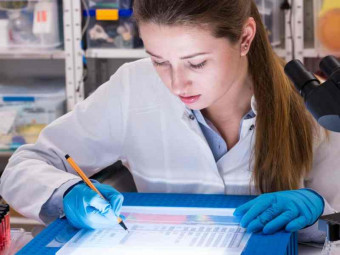A geneticist is a biologist who studies genes, inherited traits pass through generation to generation, and organism’s variation. A major part of a geneticist’s job is concerned with conducting experiments to study different living organisms like bacteria, viruses, human beings, even crops, etc. The purpose of conducting experiments is to study different diseases, their cures, check out traits responsible for the disease, and behavior of particular traits.
Responsibilities of geneticists:
Geneticists study genetics in a particular environment and experience which factors affect their behavior because the intracellular and extracellular environment may affect gene transcription. These have been used since prehistoric times to improve the quality of crops and animals. Geneticists find the defective traits after observing and modify them with healthy one to remove diseases. They found the new healthy form of genes during these experiments and produced agricultural products to cure genetic diseases.
To become a geneticist, you need to work hard. It is not so easy because of the expanding features and responsibilities. Conducting experiments and lab research are the most important and major parts of a geneticist’s job. Because of the vast competition, it is impossible to survive in this field without being updated on daily research and discoveries. They have to perform diagnostic tests continuously by extracting DNA.
In the 21st century, human genetics has become the biggest field of study. A geneticist analyzes their research data to draw the conclusion and document the whole process and publish them. Geneticists communicate with the conferences, study scientific journals, and draw new results by supervising, interpreting, reviewing, approving genetic results or findings by other geneticists, biologists, technicians, and biometricians who are working on genetics research projects. In biomedical science, new research and experience in one area provide important information to other geneticists for the research in new areas.
How to Become a Geneticist?
Once you have enough knowledge about a geneticist’s responsibilities, you may ask the next question, how to become a geneticist? Before choosing a career, you should be sure that you are willing to carry it or not because no one would like to waste their time in pursuing something they can’t. If you are sure enough about choosing a geneticist as a profession, you should keep in mind the following points: –
First, you should take into account your high school’s education. Because high school education is the base education on which professional education stands. You should avoid choosing this field if you were lazy during your high school education. It would matter if you were active and good in your studies in your high school education. It means you should have excellent grades not just in science but also in mathematics.
How long does it take to become a geneticist?
It is the most important question because many schools and colleges do not offer undergraduate genetics programs. So, to become a geneticist, you need to have a relevant graduate degree in biology, biomedical science, microbiology, or life sciences degrees. Then you proceed to a master’s degree in genetics because it is common to have a postgraduate degree. If you ultimately want to become a geneticist, then you will need to get a degree. Further, if you want to teach genetics as a university professor or lead your own research, you should have a Ph.D. degree.
Furthermore, you need to complete the STP (Scientist Training Program) If you want to work as a scientist. Then you will get a certificate from the Academy of Healthcare Science. Because of this certificate, you can apply for registration with the Health and Care Professions Council (HCPC), which allows you to practice as a clinical scientist in the UK.
Following skills can help you to become a good geneticist: –
- You should have good analytical skills to analyze data.
- You should have problem-solving skills in which patience and attention are most important.
- You should have the ability to understand complex things, which is a common factor.
- It would be best if you are a patient and team builder because teamwork matters.
- You should be good at mathematics and have some IT skills to use the computer for your ease.
- It will help if you are a critical thinker to evaluate unimportant things and find pure data.
 Install Studocu Chrome Extension
Install Studocu Chrome Extension









